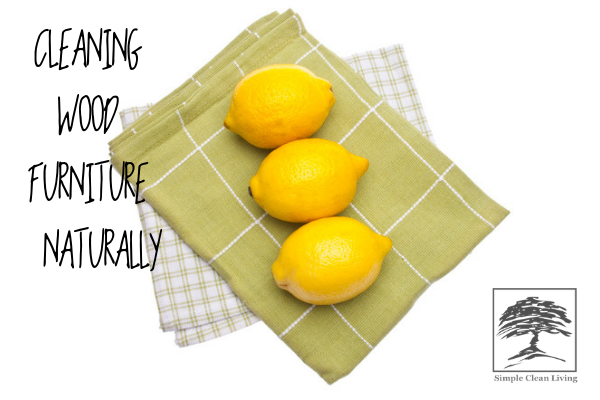Notice: I’m an affiliate for Amazon as well as other companies. Any links in this article may be affiliate links. I always appreciate it if you purchase something using my affiliate links. Doing so helps me to raise a little extra money that pays for the costs of running this site. And it allows me to continue bringing you quality content, all without costing you a thing! Thanks!
Are you sensitive to chemicals like I am? You may do well cleaning wood furniture naturally.
I have some beautiful pieces of real wood furniture in my home that I like to keep clean and healthy. And years ago, I would’ve gone and purchased a can of lemon-scented furniture polish as most people do.
That was until I learned about the toxic nature of the chemicals in that store-bought furniture polish! So that can of polish went into the garbage. And it left me looking for natural solutions to keep my furniture looking great. It also left me looking for ways to keep the air in my home much healthier too!
Not quite convinced about giving up that can of lemon-scented furniture polish? Let’s take a look at what chemicals are inside the can. We’ll also look at how they can affect your health.
These are the chemicals that are toxic to the body
Naphtha, petroleum, light alkylate (a petroleum distillate)
These nasty chemicals can affect you when inhaled and be absorbed through the skin. They can irritate the skin, eyes, nose, throat, and lungs. It can affect the nervous system causing symptoms such as dizziness, loss of balance, nausea, headache and can be dangerous for the kidneys and liver. It can also affect the respiratory system and is particularly dangerous for those who have respiratory problems. And It is highly flammable.
Polydimethylsiloxanes (Silicone oil)
We hear a lot about silicone and it is found in lots of not only household cleaners, but personal care products. And although it has been touted as safe for use, it is a gray area. The biggest concern is that silicone allows other ingredients to penetrate the skin more easily which would give you more exposure to chemicals such as petroleum distillates that do pose health risks.
Butane
You have probably heard of this before because it is used in cigarette lighters and as fuel for camp stoves. But this highly flammable gas has potential symptoms such as drowsiness, narcosis (extreme sleepiness or loss of consciousness), asphyxia, and cardiac arrhythmia.
Isobutane
Also a highly flammable gas similar to butane, this gas can cause similar symptoms.
Propane
You have also most likely heard of this….especially if you ever grill out. This is the gas used in tanks for gas grills. Luckily, you would have to be exposed to much, much more of this gas in order for it to affect your health. You simply can’t be exposed to enough of this for it to cause health problems.
So, if you are concerned about any of these ingredients (and I don’t personally want to use a product containing so many highly flammable gases), you will be happy to know that there are great ways to cleaning wood furniture naturally that are much healthier!
Looking for other natural ways to clean your house? Check this out!
Cleaning Wood Furniture Naturally
Ingredients
- 1 part lemon juice or white vinegar
- 3 parts olive oil or almond oil
Instructions
- Mix ingredients in a bowl or dish.
- Dip a soft cloth into the mix (dampen, not soak)
- Rub gently onto wood
- Allow to air dry if necessary.





Naptha? As in Fels Naptha soap? Is that dangerous?
Yes, that naptha is a petroleum ingredient and it is used in the current Fels Naptha product. Unfortunately, the Fels Naptha laundry bar of today is very different from the tallow and lye laundry bars from our grandparent’s era. I don’t recommend Fels Naptha at all because it contains petroleum ingredients, synthetic “fragrance” and solvents, all of which can make you sick! So yes, it is more dangerous than other healthier alternatives!
http://www.wisegeek.org/what-is-naptha.htm
Thanks Tara
Help! I bought a second hand dinett set, gave away my old one to a family that didn’t barebones all. When I got it home and was cleaning it, I found liquid stains in the cabinet part of the hutch. My husband thinks they are dog urine stains. How do I get rid and neutralize odor and stains. Help! Will vinegar and lemon juice work? Help!
Hi Beth! There is nothing worse than having to battle dog urine stains (I have dogs, so I’m speaking from experience). For the wood, you would be better off cleaning it with a rag dampened with some hydrogen peroxide. You can allow the rag to sit on top of the stain for awhile after thoroughly scrubbing the area with the rag first. That should work better than vinegar and lemon juice!